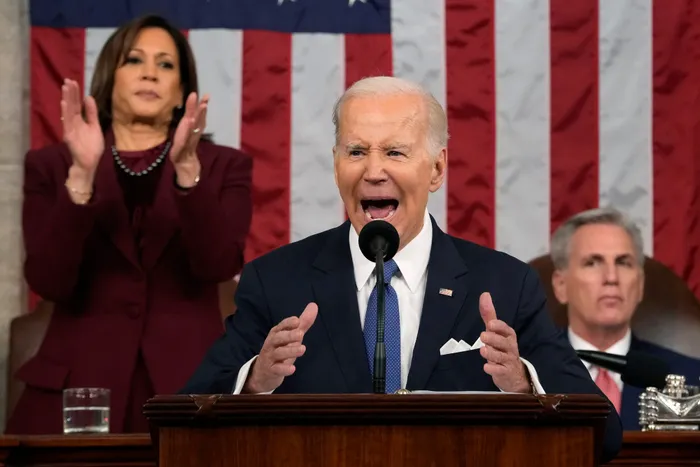Biden can make the World Bank a leader on climate change

Picture: Jacquelyn Martin-Pool/AFP – President Joe Biden delivers the State of the Union address to a joint session of Congress as Vice President Kamala Harris and House Speaker Kevin McCarthy listen on February 7, 2023. David Malpass's departure gives the Biden administration a chance to scour the entire globe for the right candidate to succeed him, the writer says.
By Mark Gongloff
Whatever David Malpass accomplished at the helm of the World Bank, he inevitably will be remembered for a high-profile blunder on climate change. His departure gives the bank a golden opportunity to be remembered for running hard and fast in the opposite direction.
Malpass will leave the bank in June about a year before his term ends and about five months after offering up a big bowl of word salad when asked the yes-or-no question of whether he believed humans were contributing to climate change by burning fossil fuels. During the controversy that followed, Malpass did walk back his comments, finally answering the question in the affirmative. And the World Bank last month promised to focus more on climate change.
But that promise came only after pressure from the US government and other G7 countries, who called for a "fundamental reform" of the development bank. Malpass's departure creates an opportunity to begin that process. It's time for the development bank to become "the leader on climate change that we need it to be," as Bloomberg LP founder Mike Bloomberg wrote last week.
For one thing, the bank must put climate change at the heart of its mandate to combat poverty and boost global development. A rapidly warming world and the extreme weather caused by climate change will only make poverty worse and the need for reliable infrastructure more pressing.
The World Bank has promised to aim 35 percent of its total financing - which hit $115 billion last year - at climate projects by 2025. This isn't nearly enough. Other big global development banks already have 50 percent targets. The bank must not only commit more of its public funds to the cause but also use its power to encourage more private investment in clean technology.
The bank could help attract private money by backstopping climate-related projects that investors might deem too risky, as Mike noted. As with any other instance of public money insuring private investments, this could create a moral-hazard problem. But with safeguards, it's easily worth the risk, given that the hope of a liveable planet hangs in the balance.
The bank must also be far more transparent about where its climate dollars are going. A recent Oxfam study called its climate-financing claims a "black box" that could be overstated by as much as 40 percent.
Getting the World Bank's leadership right won't solve all its problems, but it will be a critical starting point. As the bank's biggest shareholder, the US government gets to pick its next president, and it has almost always chosen Americans. This tradition has made increasingly less sense over the years, with developing nations rightly demanding more of a say in how their financing pie is divided.
Malpass's departure gives the Biden administration a chance to scour the entire globe for the right candidate to succeed him. Developing nations are the first victims of the havoc wrought by a warming planet, perspective the World Bank will need as it allocates resources. And people confronting climate change head on will be far less likely to deny its existence.
Mark Gongloff is a Bloomberg Opinion editor and columnist covering climate change.
This article was first published on The Washington Post
Related Topics: